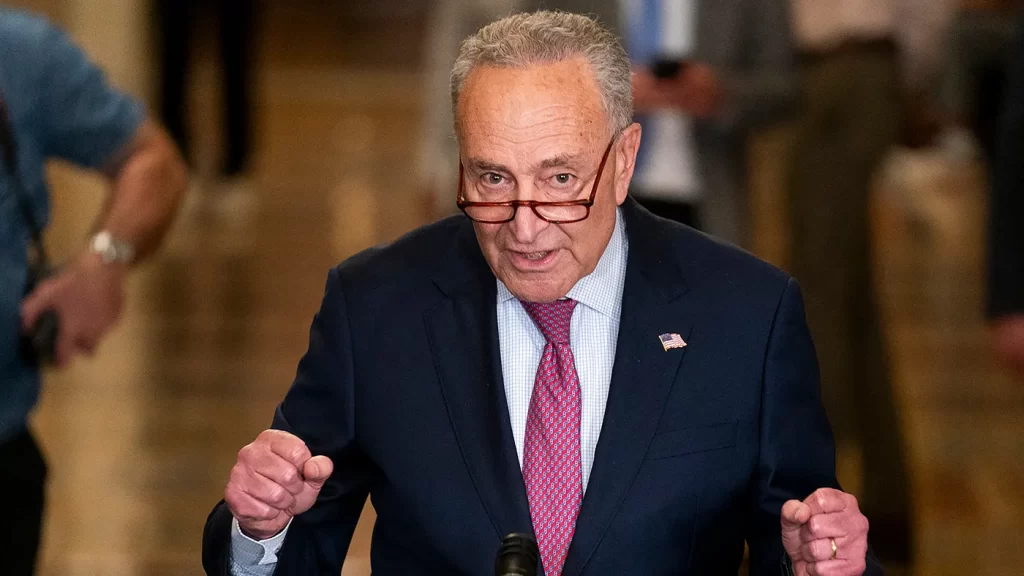Senate leaders have reached a deal that will facilitate the confirmation of several of President Joe Biden’s district court nominees, but at the cost of abandoning efforts to confirm four of his appeals court nominees. The agreement, finalized late Wednesday night, is designed to prevent Republican procedural tactics from further slowing down the confirmation process for Biden’s judicial appointments. In exchange for this, Democrats have agreed to end the push for the four pending appellate nominees.
The deal has already drawn criticism from liberal court activists, who argue that it will benefit former President Donald Trump’s ability to influence the federal courts if he returns to the White House. They believe the agreement will allow Trump to pick up where he left off in reshaping the federal judiciary, particularly the appellate courts. Despite these concerns, some of the nominees for the appeals court, such as Adeel Mangi for the 3rd U.S. Circuit Court of Appeals, had already faced significant opposition, even from within Biden’s own party. According to a spokesperson for Senate Majority Leader Chuck Schumer, the deal involved trading four appellate nominees—who lacked the necessary votes for confirmation—for more than triple the number of district court judges set to move forward.
The agreement comes after Trump called for Republicans to use all available methods to block Biden’s judicial nominees before the Democrats lose control of the Senate next year. While Republicans have not always had the votes to outright block Biden’s picks, they have employed procedural maneuvers that significantly delayed the confirmation process. These tactics have made it much harder for the Senate to quickly confirm judicial nominees, even when the votes were in Biden’s favor.
Under the new deal, the Senate will focus on confirming about 14 judicial nominees, all for district courts. Two of these nominees are still undergoing the committee process, but the rest are expected to be confirmed soon. This move puts Biden in a position to potentially surpass Trump’s record for the number of district court judges confirmed during a presidency. However, even without the four pending appeals court nominees, Biden is unlikely to match Trump’s success in reshaping the federal appellate bench and the Supreme Court.
Trump had a significant advantage when he entered office, inheriting 17 circuit court vacancies as well as an open Supreme Court seat. This was largely due to obstruction tactics employed by the GOP-controlled Senate at the end of the Obama administration. Additionally, Republicans changed key rules for appellate nominees, making it easier for Trump to fill judicial vacancies. These changes further limited the number of circuit court openings available for Biden to fill, making it much more difficult for him to make a significant impact on the federal appellate courts.
While Biden will not face the same advantages when he begins his second term, he will start with far fewer judicial vacancies than Trump did at the start of his first term. Still, liberal advocacy groups such as Demand Justice have strongly condemned the Senate deal, accusing Senate Democrats of giving Trump an opportunity to appoint more ideologically driven judges. Maggie Jo Buchanan, managing director of Demand Justice, criticized the decision, stating that it would allow Trump to continue appointing judges more committed to political agendas than to upholding the rule of law.
Despite the opposition, Senate Democrats have struggled to confirm judicial nominees in the face of unified Republican opposition and the difficulties posed by moderate Democrats such as Senators Joe Manchin and Kyrsten Sinema. Both senators have been reluctant to support nominees who do not have bipartisan backing. Earlier this week, Senate Democrats were able to confirm an 11th Circuit nominee and several district court judges, thanks in part to GOP absences and the absence of key Republican senators. However, confirmation efforts remain a challenge.
Under the terms of the new deal, Republicans have backed off procedural tactics that were blocking six district court nominees, paving the way for their confirmation votes. These six nominees, along with others awaiting confirmation for federal trial courts, are expected to be confirmed after the Thanksgiving break. Additionally, one Biden nominee for a federal trial court in Arizona was confirmed on Thursday afternoon.
Senate Judiciary Committee Chairman Dick Durbin, a Democrat from Illinois, addressed the deal’s trade-offs, saying that there had been serious doubts about whether the votes were available to confirm the four appellate nominees. He noted that balancing the opportunity to confirm a record number of district court judges with the uncertainty surrounding the appellate nominations was the key consideration in reaching the agreement.
This deal is a significant moment in the Senate’s judicial confirmation process, reflecting both the challenges and compromises that Democrats face as they work to shape the federal judiciary before the shift in party control. While the confirmation of district court judges may see a boost, the delay of four appeals court nominees represents a setback for Biden’s judicial agenda, one that may have long-term implications for the balance of the federal courts.








